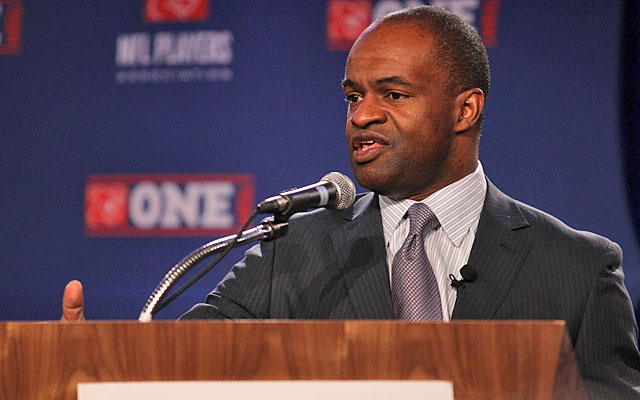The Washington Post published a feature today on DeMaurice Smith and the NFLPA developing a proposal that will take a much broader look at marijuana use by league players. The area where Smith and other NFLPA leaders will address centers around the definition of “recreational use.” In a conversation with media members, Smith said:
I do think that issues of addressing it more in a treatment and less punitive measure is appropriate. I think it’s important to look at whether there are addiction issues. And I think it’s important to not simply assume recreation is the reason it’s being used.
Does this quote by Smith sound familiar to any of you? It’s the same rhetoric being used more broadly by government to handle the opioid epidemic. I’m in no way suggesting that the league has a marijuana epidemic. But what I am saying is, it is worth looking at how and why governments and governing bodies choose to view certain situations.
It’s no secret that playing football is extremely dangerous and the long term effects are catastrophic and often fatal. Many players use marijuana for pain management because in order to do their job every week, they need to find some way to deal with the debilitating pain.
The NFL, a conservative organization in every respect, takes and adopts a lot of its policies and rules from conservative government. Marijuana use is currently banned by the NFL and positive or missed tests result in fines and suspensions for players. Like most societal laws, around drug use, the prescription is treat the “offender” like a criminal and punish. That will solve the problem. We know that is not true and has been proven over time.
Not only is the league conservative it is also hypocritical in how punishments and detrimental conduct are determined. It takes four missed or positive tests to trigger a four-game suspension without pay. An initial violation results in referral to the substance abuse program. A second violation is a fine equivalent to two game checks for the player and a third violation is a fine equivalent to four game checks. A fifth violation results in a 10-game suspension and a sixth violation results in a one-year ban. This is a pretty clear path to a suspension, not a lot of room for ambiguity. Meanwhile, known domestic abusers and players accused of sexual assault are on active rosters and don’t face similar penalties. Their path to punishment is a little less clear. How does the league justify that?
Crimes that involve the legal system add an additional layer of complexity sure. But, right is right. If zero tolerance, and moral values are more than just words the league likes to throw around then there needs to be transparency on all issues that the league considers detrimental to its image. This of course isn’t Smith’s focus but it warrants mentioning in the larger context.
What Smith is proposing would allow a more nuanced look into why certain players are choosing to use marijuana. He continued:
We have to do a better job of knowing if our players are suffering from other potentially dangerous psychological issues like depression, right? So if I look at this myopically as just a recreational use of marijuana and miss the fact that we might have players suffering from depression, what have I fixed? Worse yet, you may have solved an issue that gets the steady drumbeat in a newspaper but miss an issue like chronic depression . . . where a person theoretically might be able to smoke more weed because it makes them feel better but it’s not curing their depression.
We tend to look at these athletes and sports leagues as something outside of normal life. In some respects that is true, whatever “normal” means. What is forgotten by many is that these are human beings with problems and fears just like everyone else. Sure they perform feats of athletic achievement that causes our jaws to drop and wonder in amazement, but that’s what they do for a living. It does not make them immune from “normal” life. Like everything else in society, and sports is no different, we need to examine and look into reasons as to why. Because it is when we understand, appropriate measures can be taken to rectify.













